It’s New Year – a time for making resolutions to live better. Traditionally we vow to exercise more, eat a healthier diet, quit smoking, and spend more time with our families. Given the climate crisis, us chaps at The Friday Poem would like to suggest that as well as thinking about our own physical and mental health, we should also think about the health of the planet.
Grow some veg. Knit some socks. Cycle to work. Borrow, buy or download one of these anthologies – dipping in to them will keep you in touch with your resolution
We invite you to make a resolution to consume less, reuse and recycle more. Maybe to get involved in a protest, or some kind of community scheme. Grow some veg. Knit some socks. Cycle to work. To help strengthen your resolve as the dark days of January and February take their toll, we offer you a round-up of anthologies of eco-poetry. Borrow, buy or download one of these anthologies – dipping in to them will keep you in touch with your resolution.
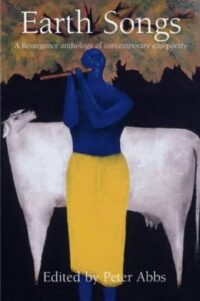
Earth Songs
Earth Songs: A Resurgence anthology of contemporary eco-poetry (Green Books, 2002, edited by Peter Abbs) was the first major anthology of contemporary ecopoetry. It offers a wide-ranging collection of poems taken from the pages of Resurgence Magazine with contributions from Wendell Berry, Sujata Bhatt, Gillian Clarke and Seamus Heaney, among others. The poems celebrate wildlife, the seasons, wilderness, and the way in which our lives are in constant creative or destructive play with the whole of nature.
Buy Earth Songs: A Resurgence anthology of contemporary eco-poetry from Amazon
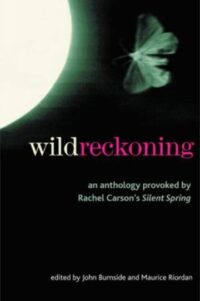
Wild Reckoning
Wild Reckoning (Calouste Gulbenkian Foundation, 2004, edited by John Burnside and Maurice Reardon) is an anthology inspired by the fortieth anniversary of Rachel Carson’s controversial and prophetic book ‘Silent Spring’, which warned against the indiscriminate use of pesticides and its consequences for the environment, and for us. The anthology features poems commissioned from leading poets including Seamus Heaney and Andrew Motion, as well as work from a number of American ecopoets.
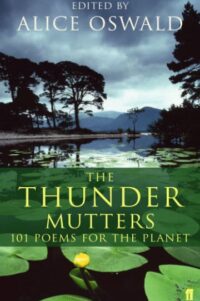
The Thunder Mutters
The Thunder Mutters: 101 poems for the planet (Faber, 2006, edited by Alice Oswald) begins with Oswald’s dedication to the rake — “an age-old implement which connects the earth to our hands, and the landscape with the sky.” She chooses 101 poems which map the border between the personal and natural worlds and include poems by Robert Frost, John Clare, Gerard Manley Hopkins, W.H. Auden, Stevie Smith, Ted Hughes, and John Ashbery, among others.
Buy The Thunder Mutters: 101 poems for the planet from Faber
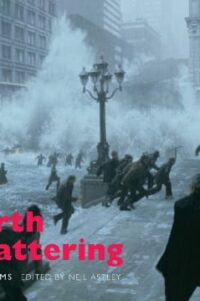
Earth Shattering
Earth Shattering ecopoems (Bloodaxe, 2007, edited by Neil Astley) ranges far and wide, from the wilderness poetry of ancient China to 21st-century native American poetry, with postcolonial and feminist perspectives represented by writers such as Derek Walcott, Ernesto Cardinal, Oodgeroo and Susan Griffin. The poems demonstrate the dangers and poverty of a world cut off from nature and ruled by technology, self-interest and economic power. Poetry may seem like a hopeless gesture, but its power lies in the effect each poem has on its readers.
Matthew Sweeney’s poem ‘Zero Hour’ from Earth Shattering resonates particularly strongly with our experiences this year. It ends:
How long before the shelves are empty
in the supermarkets? The first riots
are raging as I write, and who
out there could have predicted
this sudden countdown to zero hour,
all the paraphernalia of our comfort
stamped obsolete, our memories
fighting to keep us sane and upright?
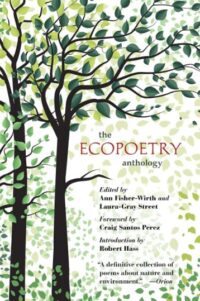
The Ecopoetry Anthology
The Ecopoetry Anthology (Trinity University Press, 2013, edited by Ann Fisher-Wirth and Laura-Gray Street, introduction by Robert Hass) is the authoritative collection of contemporary American poetry about nature and the environment. It includes poetry from iconic American poets like Walt Whitman and Emily Dickinson, followed by more modern poets like Wallace Stevens, William Carlos Williams, Ezra Pound, and more recent foundational work by poets like Theodore Roethke, Elizabeth Bishop, Robert Hayden, and Muriel Rukeyser.
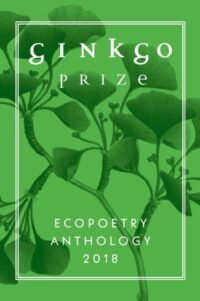
The Ginkgo Prize
The Ginkgo Prize for Ecopoetry is a major international award for ecopoetry, funded by the Edward Goldsmith Foundation and organised by the Poetry School. Every year, the competition awards £8,000 in prize money, provides writers’ residencies for the winners, and supports the development of eco-poetry through a programme of free workshops, and a series of incisive essays by leading ecological writers. It produced anthologies in 2018, 2019 and 2020 and you can download and read them all.
Download the 2018 Ginkgo Prize Ecopoetry anthology
We particularly like Linda France’s poem ‘In the Physic Garden’ from the 2018 Ginkgo anthology:
In the Physic Garden
Andrew asks if spiritistically is a word
it is now I say
how do you spell it he says
and we sound out the letters together
him way ahead of me
written down they’re ghosts
of the evening primrose
throwing up its arms behind us
MOTH’S MOON FLOWER
says the sign and we lean in
to yellow like thunderbugs
drinking from wilting cups
spiritistically we are yellow
and black when they are the same
night and day – me and Andrew
his words I want to save
and the flowers I can’t
and it’s okay
what does kill or cure mean he says
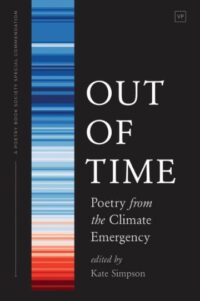
Out of Time
Out of Time — Poetry from the Climate Emergency (Valley Press, 2021, edited by Kate Simpson) features original work from Caroline Bird, Inua Ellams, Pascale Petit, Karen McCarthy Woolf, Rachael Allen, Raymond Antrobus and Mary Jean Chan, among others. Tom Chivers of Penned in the Margins says “Out of Time presents an excoriating critique of Earth’s ongoing encounter with humankind – the language animal – in poems that charm, disrupt, convince, cohere and break apart … This is vital work for a future that is already here.”
Buy Out of Time — Poetry from the Climate Emergency from Valley Press
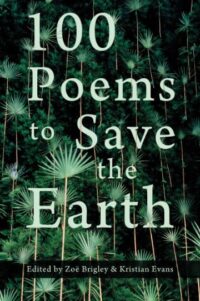
100 Poems to Save the Earth
100 Poems to Save the Earth (Seren, 2021, edited by Zoe Brigley) begs the question how, exactly, poetry can save the world? Writing from rural and urban perspectives, linking issues of social injustice with the need to protect the environment, contemporary poets from Britain, Ireland, America and beyond suggests that poetry can act as a wake-up call, that it can “find the words to describe how it feels, to sing to what hurts, to reach out … and to see all things as our kin”.
Gillian Clarke’s poem ‘Cantre’r Gwaelod’ is one of our favourites from 100 Poems to Save the Earth. It is a denunciation of an indifferent age, and ends:
‘for Earth’s intricate engineering, unpicked
like the flesh, sinews, bones of the mother duck
crushed on the motorway, her young
bewildered in a blizzard of feathers;
the balance of things undone by money,
the indifferent hunger of the sea’.
Keep it in the Ground
It’s not exactly an anthology, but in 2015 The Guardian asked Carol Ann Duffy to organise 20 original poems by various authors on the theme of climate change. There are poems by Simon Armitage, Jo Bell, Rachael Boast, Sean Borodale, Colette Bryce, Gillian Clarke, Imtiaz Dharker, Maura Dooley, Theo Dorgan, Matthew Hollis, Jackie Kay, Lachlan Mackinnon, Michael Longley, Paula Meehan, Robert Minhinnick, Paul Muldoon, Alice Oswald, Don Paterson, Michael Symmons Roberts and David Sargeant, as well as one by Carol Ann Duffy herself.
Read them all on The Guardian’s website here and (if this is your thing) you can listen to various celebrities reading them here. Our favourite of the lot is ‘The Question’, by Theo Dorgan:
The Question
When the great ships come back,
and come they will,
when they stand in the sky
all over the world,
candescent suns by day,
radiant cathedrals in the night,
how shall we answer the question:
What have you done
with what was given you,
what have you done with
the blue, beautiful world?

